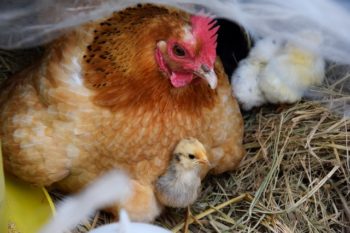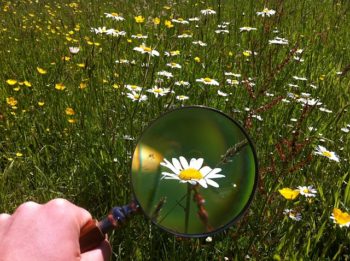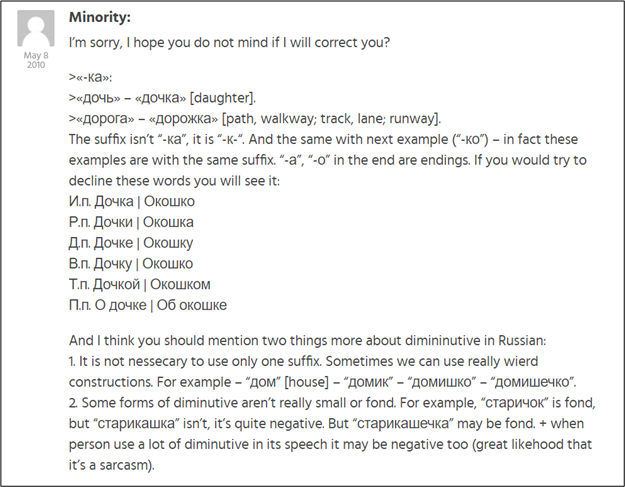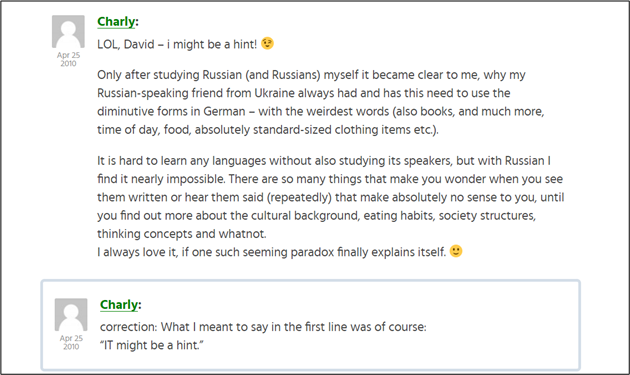Russian Diminutives Part II Posted by bota on Jan 26, 2021 in Culture, Grammar, language
“Diminutives” is one of the coolest aspects of Russian, but you know what’s even cooler? Finding an old Part I blog on this channel about diminutives and realizing that there isn’t a Part II in the archives. Your insightful comments on that blog (and really all the blogs here) are so contagiously curious about the Russian language that I just can’t resist sharing all that was said about diminutives and giving you the promised part II.
First, how do we know which suffix to use with what word? Because as cute as diminutives are, these suffixes do not pair up with nouns haphazardly. In other words, you can’t just take the word “ма́ма” (mom) and add a random suffix to it. Sure, it might work with quite a few, as in:
ма́тушка, ма́мочка, ма́менька, маму́ля, маму́ль, маму́ся, маму́сечка, маму́лечка
But not with these: мамурка, мамышка, ма́монька, ма́мик, ма́мчик
And yes, an average native Russian speaker would probably tell you that the process is intuitive. Nevertheless, there are a few ground rules concerning noun gender and suffixes.
Masculine Nouns
-ец
- Бра́т – бра́тец [brother]
-чик
- бли́н – бли́нчик [pancake]
- за́яц– за́йчик [hare]
- су́п – су́пчик [soup]
- клю́ч – клю́чик [key]
- шка́ф – шка́фчик [closet]
–ок, -ек, -ёк
- кру́г – кружо́к [circle]
- творо́г (or тво́рог) – творожо́к [cottage cheese]
- я́щик – я́щичек [drawer]
- руче́й – ручеёк [stream]
- носо́к – носо́чек [sock]
-ик
- ко́т – ко́тик [cat]
- мя́ч – мя́чик [ball]
- пёс – пёсик [dog]
-очек, -ечек, – ёчик
- мешо́к – мешо́чек [bag]
- гла́з – глазо́чек [eye]
- цвето́к – цвето́чек [flower]
Feminine Nouns
-иц
- бу́ква – бу́квица [letter]
-ичк
- гу́сеница – гу́сеничка [caterpillar]
-к
- трава́ – тра́вка [grass]
-очк, -ечк
- ба́нка – ба́ночка [jar]
- кни́га – кни́жечка [book]
Neuter Nouns
-ец
- письмо́ – письмецо́ [letter]
-к
- окно́– око́шко [window]
–ышк
- перо́ – пёрышко [feather]
Now, let’s follow up on some of the comments:
1. The more the merrier:
Yelena makes such a valid point that suffixes for diminutives can be piled up on each other: кни́га – кни́жка – книжо́нка – книжо́ночка (book). Notice the difference in the connotations among the four words, which brings me to the next comment.
2. Diminutives can be bullies, too
As Minority points out, diminutives can be sarcastic. Старика́шечка is more about Ebenezer Scrooge than a friendly old neighbor. Pay attention to the speaker’s intonation and contextual clues.
3. Are they translatable?
David, “bookie” is a great example of a Russian speaker’s attempt at bending English suffixes to the rules of Russian diminutives. They are not too far off. “Hubby” and “wifey” are common terms of endearment in English. Likewise, the word “sciency” is a close contestant to giving a word that “scaled-down” quality.
There are cases in English when suffixes have diminutive qualities, like:
Drop – droplet
Kid – kiddo
Bit – bitsy (as in itsy-bitsy spider)
Small – smallish
This doesn’t mean that the rules are transferrable. A Russian talking about “цвето́чки, я́годки, листо́чки” won’t be able to add “y” or “ie” to the English words such as “flower, berries, and leaves”. Instead, they might resort to adding adjectives, metaphors, and contextual clues to indicate the cuteness of the said flora. That sense of smallness or intimacy has to be conveyed through other language tools.
4. The tip of the iceberg
Charly is absolutely right – language does not exist in a bubble and understanding the people behind it is often the key to solving those paradoxes.
There are a few more fascinating things about Russian diminutives (though other languages have them too) and the stuff is truly worthy of linguaphiles and philologists. First, is that diminutives often become more popular than the original word, therefore making the OG form a thing of the etymological dictionaries. For example, the Russian word for “sun” is со́лнце which was the diminutive of “со́лнь”. The “new” diminutive is со́лнышко.
In other instances, the derived diminutive takes on a meaning different from the original, therefore becoming its own thing: кора́ – кори́ца (tree bark – cinnamon); о́браз – образе́ц (image – example). This case study makes a thrilling bedtime read about diminutives if you wish to continue geeking out about this grammar topic with me. Also, Charly, I’ve read that Ukrainian has diminutives for the verbs too! Now, I would read about that!
Did you enjoy learning about the diminutives? Find out more in my next blog about how to use diminutives with names.

Build vocabulary, practice pronunciation, and more with Transparent Language Online. Available anytime, anywhere, on any device.










